Get posts by email
A late in the game feminist critique of the labour of reducing household consumption (& why I shop at Costco)
November 12, 2021
My introduction to consumer consciousness was facilitated through blogging. What started seventeen years ago as a way of keeping in touch with family morphed into a means of finding and connecting with crunchy moms like myself in a rapidly-expanding new territory called the Internet.
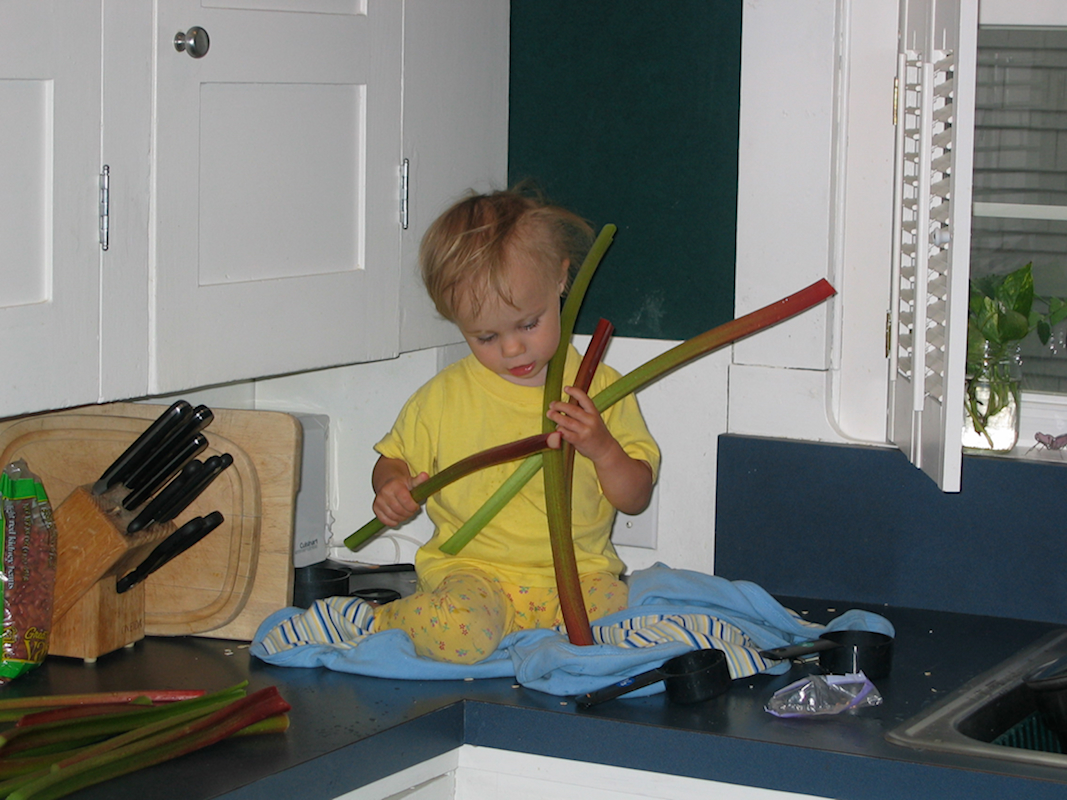
kids in the kitchen 2004
It was 2004 and the apogee of commercialization and entrepreneurial careers that women would launch themselves into from such humble beginnings could not even be imagined. Eventually mommy blogging and even more ironically, “green living” blogging, would largely be co-opted by the consumer culture it once critiqued. For as blogging “revolutionized the marketing/advertising industry” (van Esch et al., 2018, p. 779) so too did the marketing/advertising industry revolutionize blogging. But before all that would happen, what we were building in those early days was community and connection (Hunter, 2016).
I found belonging and identity in the ecologically-conscious subset of the mommy blogging world, a cohort of Gen X women who were stay at home moms, and often, homeschoolers. I was arriving at my own consumer-consciousness through a mix of IRL, local influences and inspirations (living in Maine and making friends with community activists will do that to you). And through the world wide web of lifestyle blog posts, book reviews, and forums, where North American women were changing the world by changing their household consumption. The Story of Stuff was our cultural currency.
Homemaking and home, once characterized by second wave feminists as a means and “site of oppression” (Mallett, 2004, p. 75) and “economic exploitation” (Demo, 2015, p. 5), was being reclaimed by a new generation of environmental and socially conscious women (and men) who wanted to wrest domesticity from a consumer culture (Hayes, 2010).
Home was not where we consumed but where we produced - gardens, meals, education - and of course, our own media in the form of blogging.
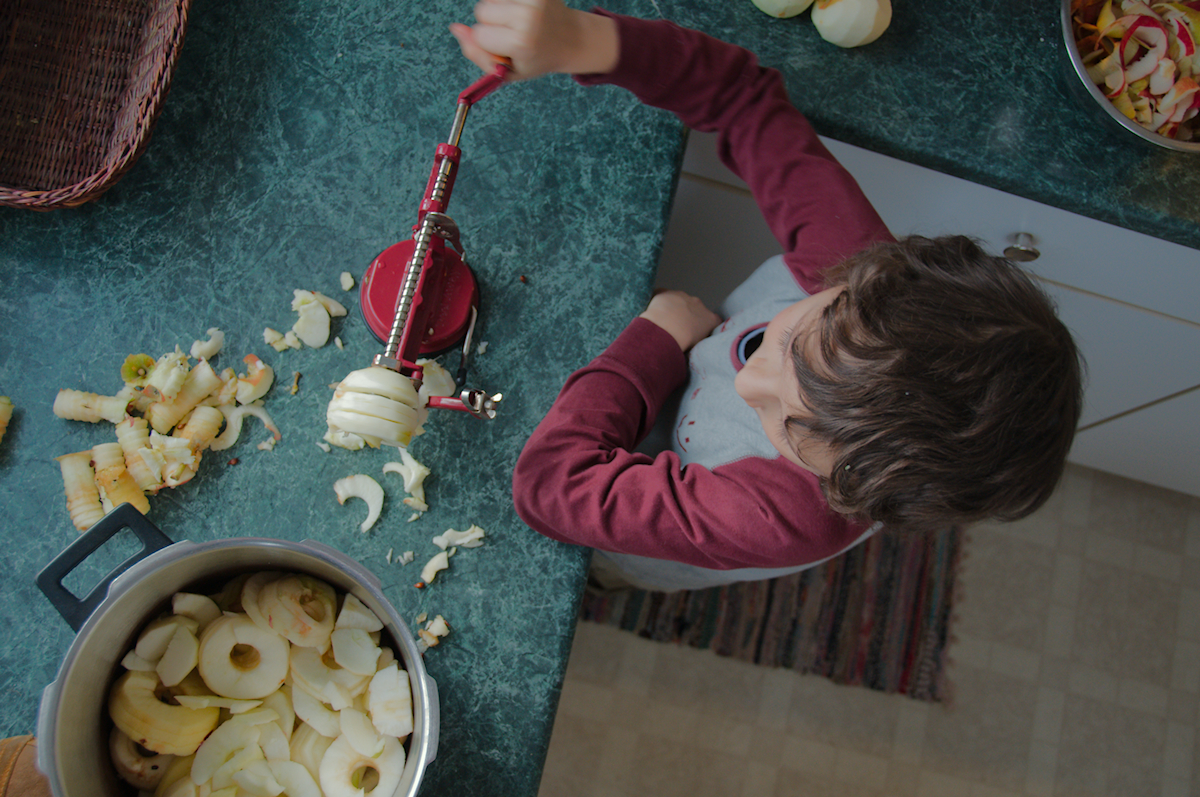
kids in the kitchen 2010
I identified with an online cohort of largely white, middle-class women who were raising babies, tending the home fires, and often homeschooling children while embracing practices of voluntary simplicity in contrast to mainstream affluenza messaging.
We were swapping recipes for the kale, beets, and kohlrabi found in our weekly Community Supported Agriculture (CSA) boxes. We were making our own soap and household cleaning products. We were transforming backyards into gardens. We were learning to can and “put up” food. We were raising chickens in suburbia. We were hang drying our laundry and ridding our homes of plastic. We were eating plant-based diets. We were vermicomposting in our basements. We were eschewing TVs and their materialistic influences from our homes. We were crafting homemade Christmas gifts. We were rejecting the consumeristic messages of our own youth lived in the 80’s and 90’s.
(The only thing I did not personally do from the list above was raising chickens. We didn’t eat eggs.)
Our blogging about “everyday life and self-presentation in the form of personal and family affairs” (Haider, 2014, p. 239) was a means of signalling our identity and affiliations while sharing our lived experience and demonstrating alternatives to mainstream consumer behaviors and habits.
Long-time readers will know that monetizing my blog with a plethora of consumer ads was not a path I wanted to walk, though I was willing to feature select products and services, sometimes my own, in a minority of my posts. As blogging become more commercialized and niched my own writing evolved to a more personal narrative about spiritual growth and individual transformation, with regular “here’s what the family’s up to” on the side.
I explicitly closed the “green living” chapter of my blog nine years ago, as even back then my habits and writing were shifting.
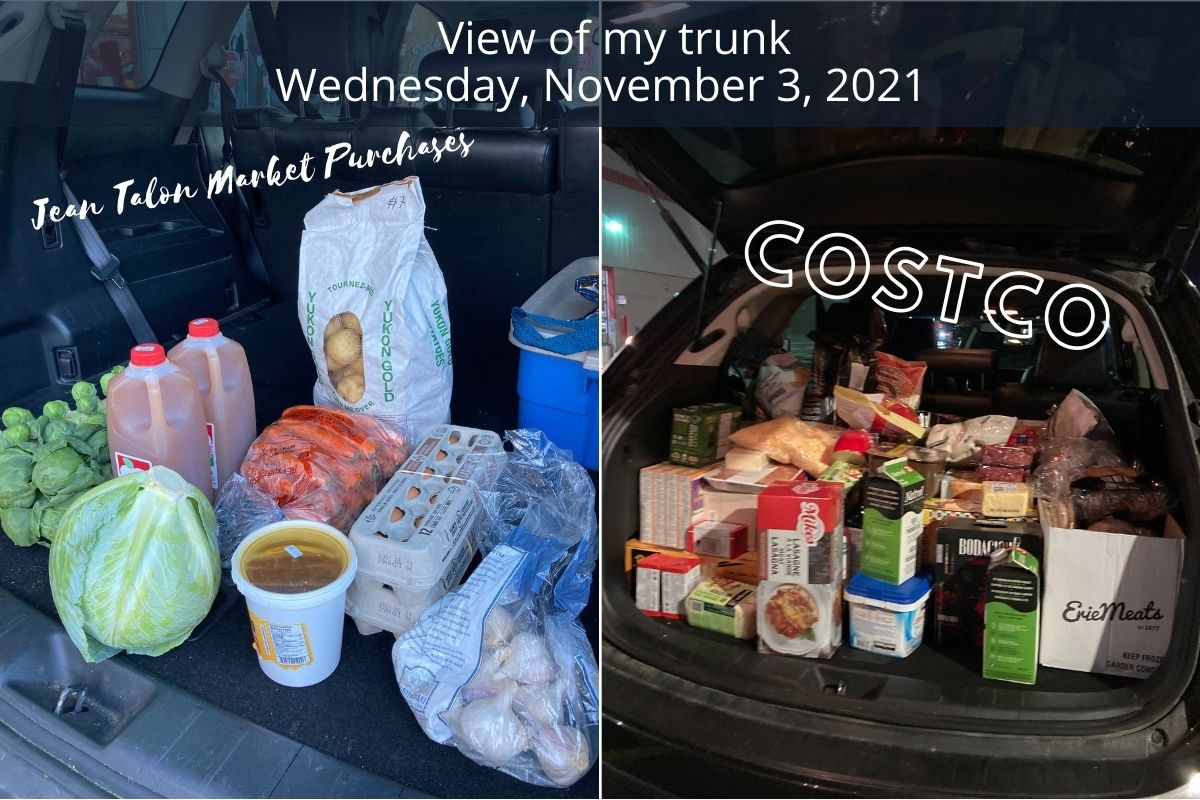
Nothing signifies the radical change in my home economy consumer habits, from those early blogging days to now, quite as tellingly as a recent shopping trip to Costco. Where I spent over $750 on groceries and household products, which is on the low side of my regular monthly Costco expenditures. I didn’t shop at Costco before moving to the city 6 years ago. But as the kids became teens became young adults, the cost savings of Costco shopping for a family of five was undeniable.
It wasn’t that we started spending less on groceries, it’s that by spending the same amount we could now buy things we didn’t used to eat.
Convenience foods, beverages, packaged snacks. These foods freed up my labour and time from food preparation.They also increased our contribution to city waste and recycling. A guilt that is unassuaged by the fact that Montreal’s recycling program may or may not be removing recyclables from landfills.
Home, as a physical and relational space has never been a place of oppression for me. It’s a haven, a safe retreat from public space, and a locus of production (Mallett, 2004). I heartily disagree with Engels assertion, cited by Demo (2015), that “the emancipation of women will only be possible when women can take part in production on a large, social scale, and domestic work no longer claims anything but an insignificant amount of her time” (p. 5).
However, as much as I love home and identify as a homemaker, I did grow tired of spending so much time in the kitchen. Like untold numbers of women before me.
Costco to the rescue.
For twenty-five years I have managed our family's household expenses and consumption. Food has been our largest monthly expense for many years, sometimes costing more than housing, fuel, insurance, education, clothing, and entertainment put together.
What you eat, how it's grown, where it comes from, how it's transported, and the waste it generates are part of the calculations of an individual or household ecological footprint. I've done a lot of work over the years to mitigate our family's contribution to environmental degradation. Doing this work has taught me a salient lesson about pushing against the consumer-mindset of our culture. It takes a lot of labour.
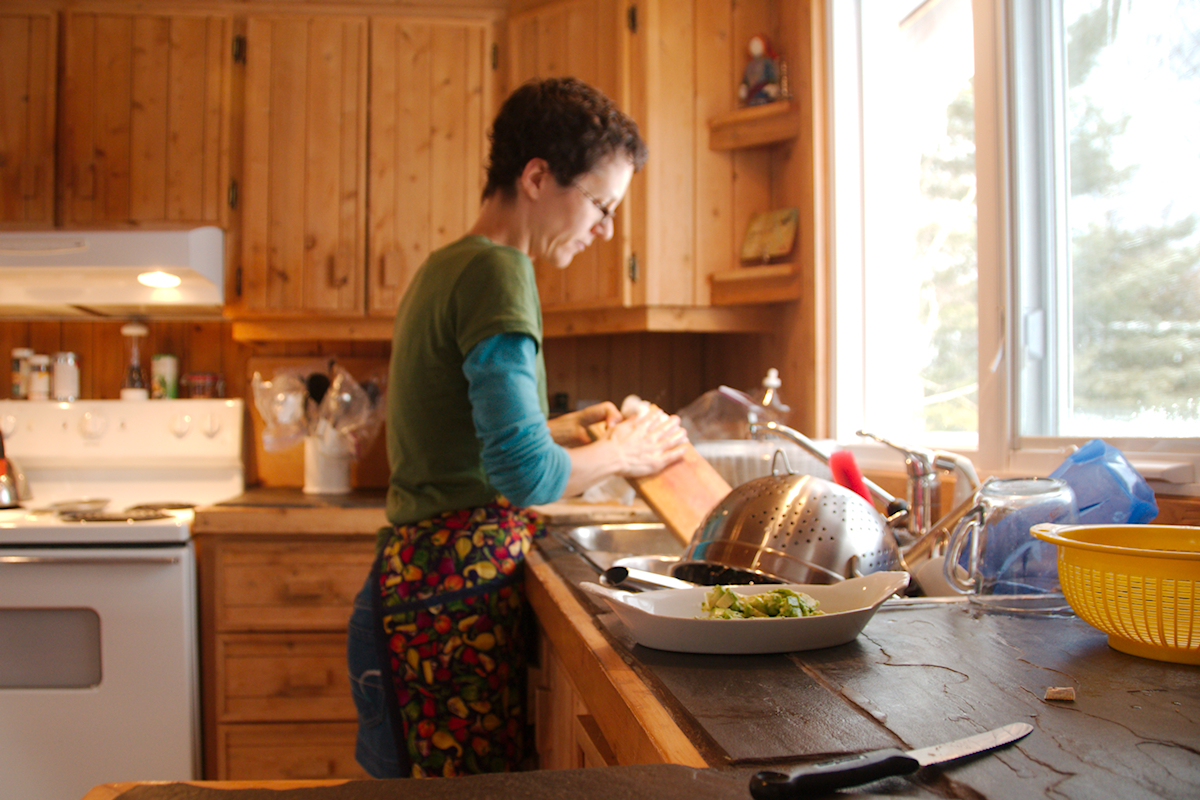
2012
In the United States, according to Demo (2015) women are “responsible for 85% of family purchasing decisions” (p. 2) and as reported by the IWPR, women contribute a disproportionately higher number of hours to household tasks (2020), even if they are working outside the home. This situation is not radically different in Canada (Stats. Can., 2018).
Back when I was raising my rolling pin, I used to make almost all our food from scratch and I was very concerned about where we sourced that food. I did the math one summer, a labour journal of sorts, and I calculated that I spent the equivalent of full time employment planning, sourcing, and cooking our family’s food. Time that included active membership in a CSA, weekly trips to the local health food store, and managing a small community food buying coop.
It was an incredible effort, a feat made possible by our middle class privilege that didn’t require me to be in the paid workforce. Instead, my unpaid labour, an important contribution to the household, was to manage (often micro-manage) all our expenditures and consumption to maximize the expression of our values while living within our means.
An evolution of self, marriage, family life and moving to Montreal changed a lot of that.
Norris (2011) writes that our consumption habits are “an affirmation of self, a way of acting in the world, of expressing one’s identity and difference and participating in something larger than oneself.” (p. 14) My earlier “buy local, eat only plants, hang dry all our laundry, and cook all our food from scratch” iteration of self is nodding her head, all the way back there in 2008. While she nods, somewhat self-righteously, my current self wonders: what statement of identity is expressed in my present household consumption practices? What values am I signalling?
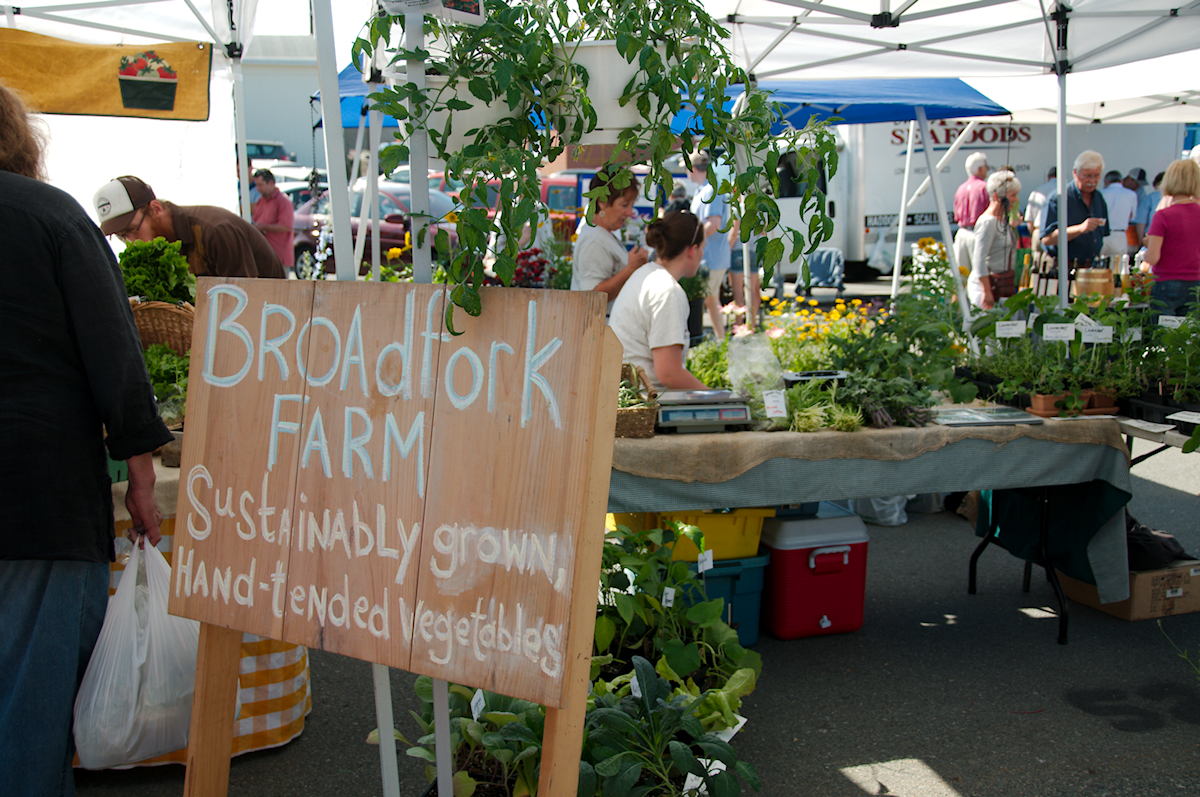
going to the market 2011
I don’t identify with the marketing messages that you can buy happiness or that transformation is just a facial cream away. These are antithetical to my values of connection, relationship, service, togetherness, and ultimately love, as the source of meaning and fulfilment in our lives. Interestingly, these values are largely lived through my unpaid emotional and physical labour in my home and family.
However, whereas my earlier self was willing to exchange a large share of personal labour in return for the intrinsic satisfaction of pursuing a consumer-driven ecological shift, my current self is not willing to make that exchange.
In no way am I dismissing my own past labour or the labour of other folks in voluntary simplicity and reducing household consumption.
Rather, what I am saying is that I am no longer willing to bear a disproportionate burden of labour in a culture of neoliberal discourse that places the responsibility, cost, and locus of sustainability squarely on the individual. And in the case of household economy, squarely on women. A discourse that not only was I ignorant of during the peak of my family’s anti-consumeristic practices, but that took advantage of my “desires of personal freedom, quality of life and fulfillment of self-realization potential” making me both a subject to, and co-participate in, “the construction of the neoliberal rule” (Pyysiäinena et al., 2017, p. 217).
Paying attention to my consumption, reflecting on consumerism and materialism, evaluating and changing my buying and eating habits, raising and educating children with an alternative perspective - I’ve given years of my life to these practices.
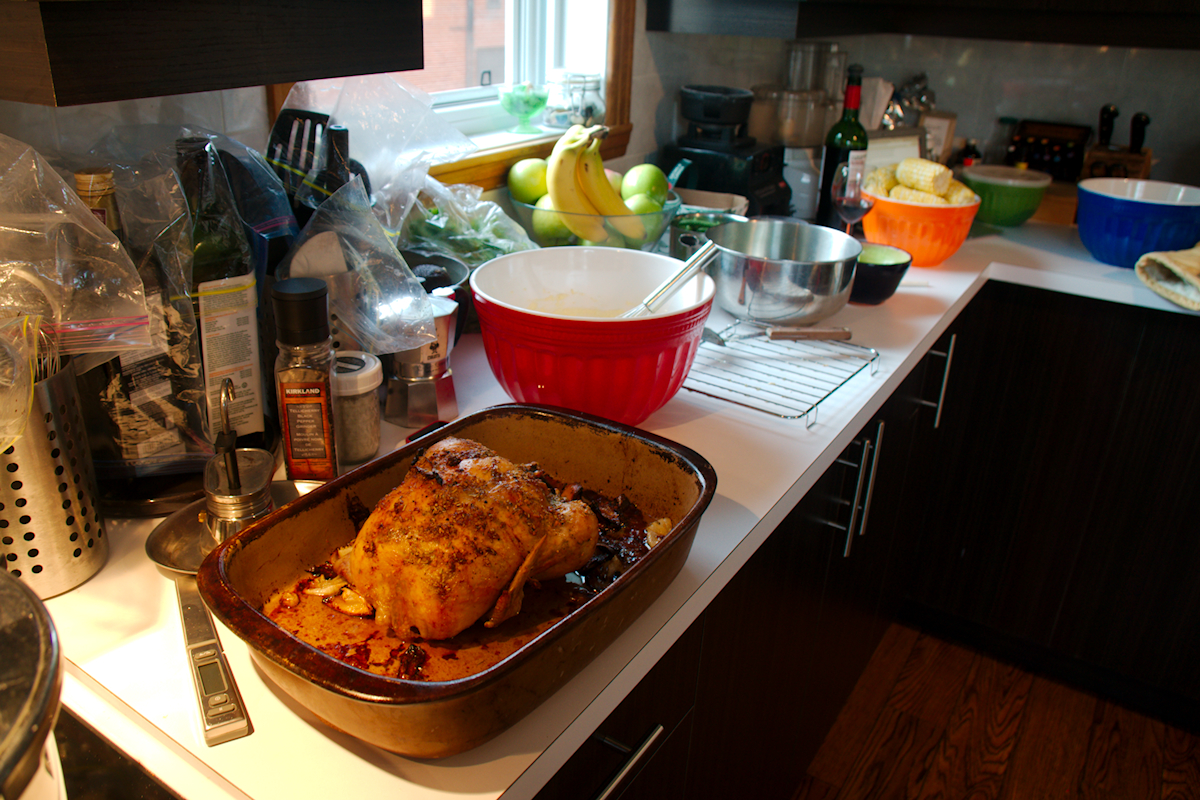
chicken supper 2016
However, I am much more critical these days of the message that my labour is what is required to shift the ecological narrative.
Absolutely our actions matter, our household choices around food, housing, energy use, and transportation are important (Dubois, 2019). And I could certainly signal my own virtue here (circa 2008 style) by listing my personal and household eco-friendly decisions, which are not insignificant, but always have room for improvement.
Instead, I want to acknowledge that the emphasis on individual and household consumer habits is a neoliberal deflection tactic to shift the responsibility off of governments, corporations, and large-scale players that need to change policy and production to see real ecological impact (Lukacs, 2017). Further, I think a critique of neoliberal rhetoric around individual consumption as a primary driver of social, economic, and ecological change is especially necessary considering that household labour, where reduced consumption behaviours are lived out, is borne largely by women.
Surprise, surprise! This post is a school assignment and I’ve created a new category to catalog these posts. Imagine if I keep blogging for another seventeen years? What kind of self and societal critique will I be writing in 2038!
Part one of my assignment was too keep a consumption journal for a couple weeks, paying attention to my habits and patterns so I can reflect on my experiences through the lens of our pervasive consumer culture that promises fulfilment and well-being in what you buy.
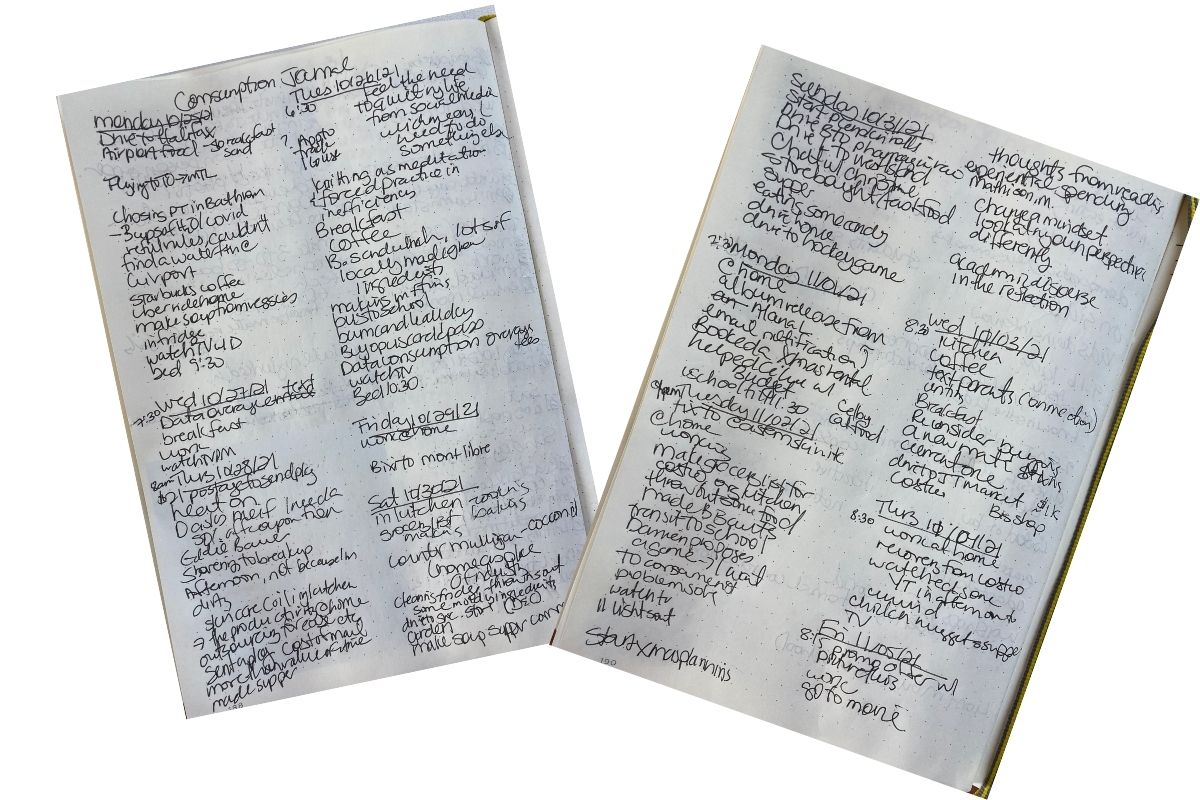
I recorded my consumption and reflections in my trusty yellow bullet journal for dates of October 25 - November 5. A monthly Costco shopping trip was scheduled during this time and was the perfect jumping off point for thoughts that have been brewing for some time around the unpaid labour of reduced consumption and the neoliberal discourse about who is responsible for this labour.
Part two of the assignment is take an action, large or small, to shift my consumption.
This one was easy, though loaded with its own contradictions, and is related to my Costco shopping. No, I’m not changing my Costco buying habits, net yet.
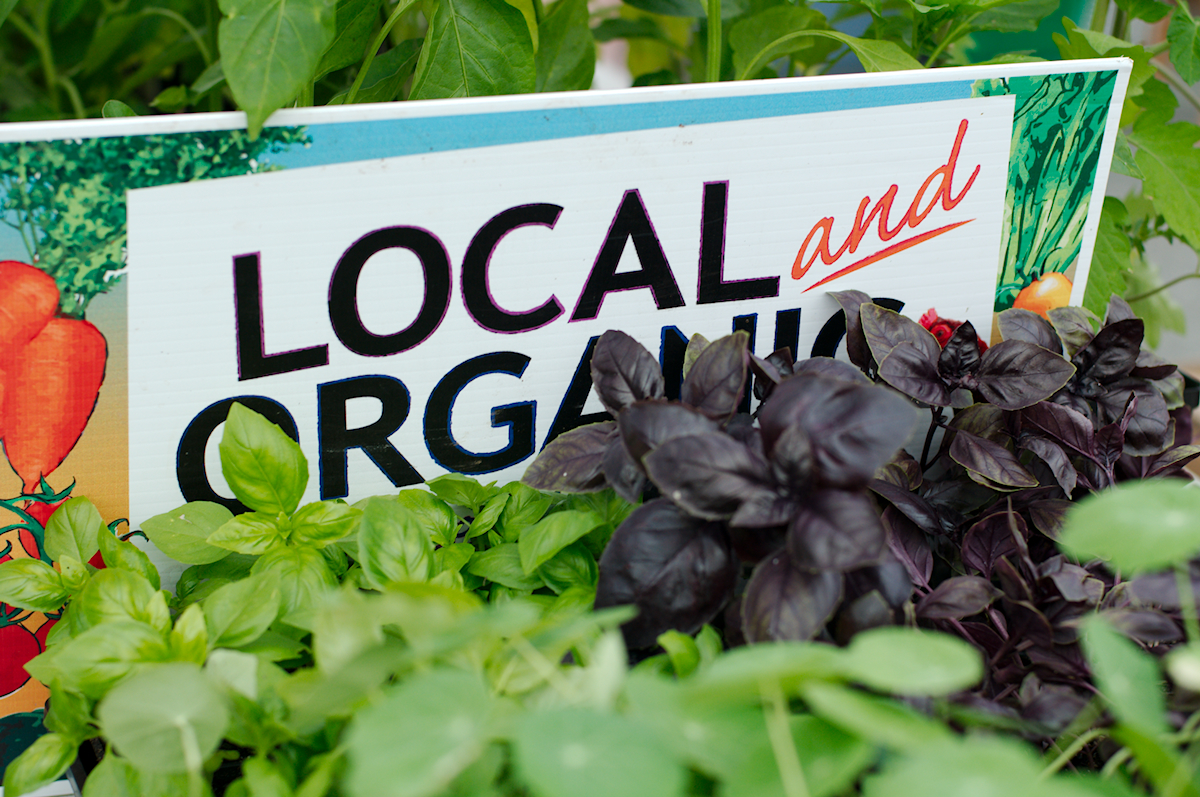
For now, my consumer change is this: we’re buying one of those bubbly water machines. Oh, the irony of buying something to reduce my consumption. I recognize we could just drink Brita-filtered tap water. (All my truly crunchy friends are hiding behind their Berkey water filters as I type that.) That’s another thing I want to buy, a Berkey Filter, but I digress.
I few years ago I caved to the family’s request to buy canned carbonated water drinks. What was a special treat when my children were young become an everyday item. (This was well before the pandemic stockpiling of canned beverages caused an aluminum supply shortage in 2020 which started me questioning our family’s “aluminum footprint”.)
A habit was born and for several years now our family of five has been contributing approximately 100 aluminum cans per month to the recycling waste stream. That’s 1,200 cans per year. This is in addition to infrequent soda cans, more frequent beer bottles and other beverage packaging.
I can’t even be assured that the waste of this habit gets recycled.
Last spring while we were living with my parents for 6 weeks and using their soda machine I did the math of how much it costs to use a soda machine instead of buying Costco-priced canned carbonated water. It wasn’t cheaper. The initial outlay for the machine, the bottles, and the on-going cost of the CO2 cartridges was more expensive. Plus there’s the hassle of finding cartridge recycling (more labour). I didn’t want to take that on.
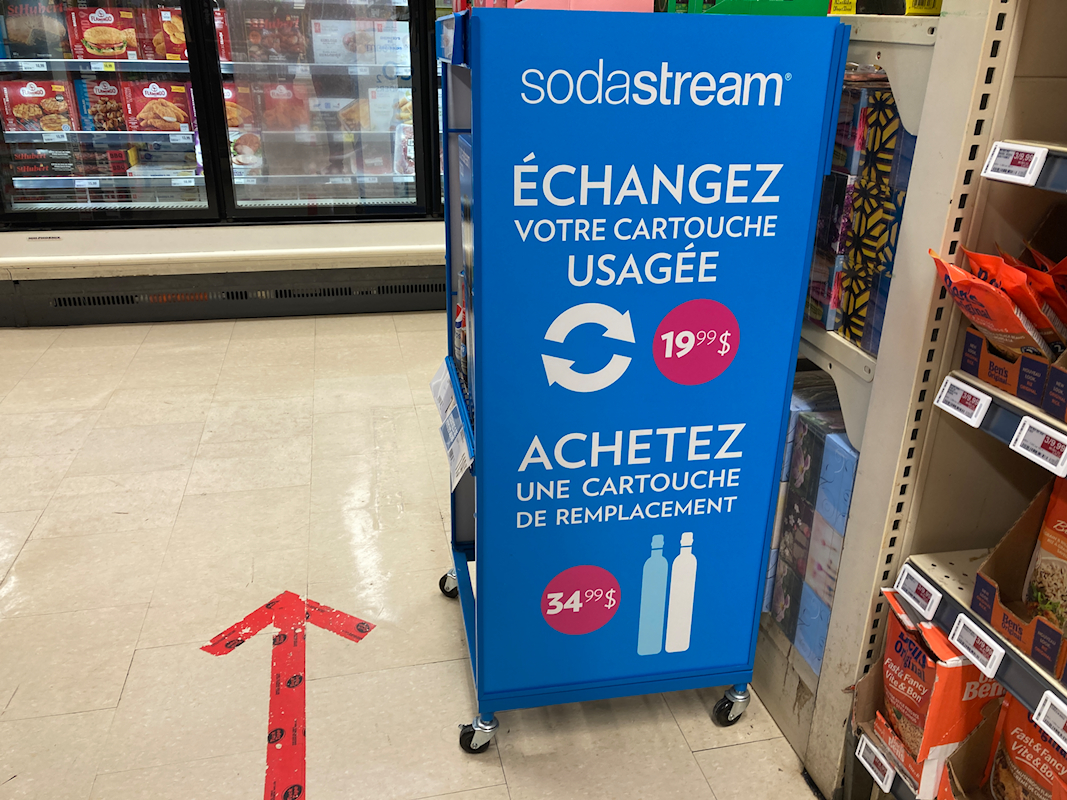
I decided “no”. But the copious collection of cans in our recycling bins and the knowledge that I was externalizing the cost of production and energy that goes into making and recycling aluminum cans was wearing me down, regardless of the “bottom line”. Then I noticed this summer that our local grocery store sells and exchanges used cartridges.
So we’re finally buying the bubbly machine.
Like the budget-conscious consumer I am, I’m waiting to see if there will be any Black Friday Cyber Monday deals on these machines. If not, I’ll see if a local store sells them. Does Canadian Tire count as local? Maybe I’ll get lucky and find a sale.
I’ve already checked at Costco. They don’t sell them.
For posterity sake here are the slides from my in-class presentation of this assignment.
References
Demo, A. T. (2015). Reframing motherhood: Factoring in consumption and privilege. In A. T. Demo, J. L. Borda & C. Kroløkke (Eds.), The motherhood business: Consumption, communication, and Privilege (pp. 1-27). Tuscaloosa: The University of Alabama Press.
Dubois, G., Sovacool, B., Aall C., Nilsson, M., Barbier, C., Herrmann, A., Bruyère, S., Andersson, C., Skold, B., Nadaud, F., Dorner, F., Moberg, K. R., Ceron, J. P., Fischer, H., Amelung, D., Baltruszewicz, M., Fischer, J., Benevise, F., Louis, V. R., Sauerborn, R. (2019). It starts at home? Climate policies targeting household consumption and behavioral decisions are key to low-carbon futures. Energy Research & Social Science, 52, 114-158. https://doi.org/10.1016/j.erss.2019.02.001
Haider, J. (2014). Taking the environment online: Issue and link networks surrounding personal green living blogs. Online Information Review, (38)2, 248-264. DOI 10.1108/OIR-03-2013-0052
Hayes, S. (2010). Radical homemakers: Reclaiming domesticity from a consumer culture. Richmondville, NY: Left to Write Press. ISBN 978-0-9794391-1-7.
Hunter, A. (2016). Monetizing the mommy: mommy blogs and the audience commodity. Information, Communication & Society, (19)9, 1306-1320. DOI: 10.1080/1369118X.2016.1187642
Institute for Women's Policy Research. (2020). Providing unpaid household and care work in the United States: Uncovering inequality: Briefing Paper https://iwpr.org/wp-content/uploads/2020/01/IWPR-Providing-Unpaid-Household-and-Care-Work-in-the-United-States-Uncovering-Inequality.pdf
Lukacs, M. (2017, Jul 17). Neoliberalism has conned us into fighting climate change as individuals. The Guardian: International Edition. https://www.theguardian.com/environment/true-north/2017/jul/17/neoliberalism-has-conned-us-into-fighting-climate-change-as-individuals
Mallett, S. (2004). Understanding home: a critical review of the literature. The Editorial Board of The Sociological Review, (52)1, 62-89. https://doi-org.lib-ezproxy.concordia.ca/10.1111/j.1467-954X.2004.00442.x
Norris, T. (2011). Consuming Schools: Commercialism and the End of Politics. University of Toronto Press, Scholarly Publishing Division.
Pyysiäinena, J., Halpinb, D. & Guilfoylec, A. (2017) Neoliberal governance and ‘responsibilization’ of agents: reassessing the mechanisms of responsibility-shift in neoliberal discursive environments. Distinktion: Journal of Social Theory, 18(2). 215-235. https://doi.org/10.1080/1600910X.2017.1331858
Statistics Canada. (2018). Time use: Total work burden, unpaid work, and leisure. https://www150.statcan.gc.ca/n1/pub/89-503-x/2015001/article/54931-eng.htm
van Esch, P., Arli, D., Castner, J., Talukdar, N., & Northey, G. (2018). Consumer attitudes towards bloggers and paid blog advertisements: what’s new? Marketing Intelligence & Planning, (36)7, 778-793. DOI 10.1108/MIP-01-2018-0027
You can subscribe to comments on this article using this form.
If you have already commented on this article, you do not need to do this, as you were automatically subscribed.





